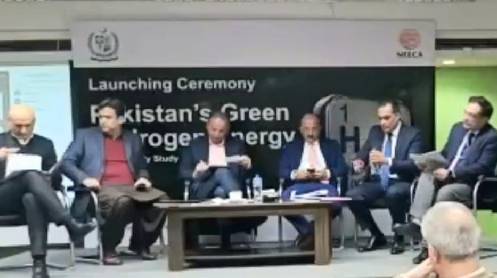OGRA to fully back launching of Green Hydrogen as new reliable alternative energy option in Pakistan
The Oil & Gas Regulatory Authority (OGRA) has held out the firm assurance that it will fully support the introduction of green hydrogen to Pakistan’s energy supply chain to cut harmful hydrocarbon emissions and reduce fuel import bill for the improvement of the environment and economy.
This was stated by OGRA Chairman, Masroor Khan while speaking as the chief guest at the recently held ceremony for launching the pre-feasibility study on the introduction of Green Hydrogen in Pakistan. The National Energy Efficiency and Conservation Authority (NEECA) hosted the ceremony.
Khan told the audience at the launching ceremony that billions of dollars could be saved annually for foreign exchange reserves by introducing the green hydrogen option to curtail fuel import expenses of the country.
He assured the audience that OGRA would extend full support for adopting the regulatory mechanisms and frameworks for introducing Green Hydrogen as the new reliable alternative energy option in the country.
He suggested that the automotive sector was the field, which could initially be selected for the introduction of the Green Hydrogen alternative energy option in Pakistan.
Speaking as another guest of honour, former Minister of State for Petroleum, Dr Musadik Malik, said that such a financial model should be introduced for launching the Green Hydrogen energy, which shouldn’t overburden the public exchequer due to involvement of financial subsidy by the state.
He said the Green Hydrogen option should be launched in a financially sustainable manner and shouldn’t involve the payment of subsidy by the government in any form, unlike the existing energy systems in the country. For this purpose, sustainable energy systems of the neighbouring countries should be properly studied, he said.
Dr. Sardar Mohazzam, Managing Director of NEECA presented the background for conducting the green hydrogen energy study in Pakistan. Mr. Stephen B. Harrison, International Expert on Green Hydrogen and Dr. Nadeem Javed, Ex-chief economist presented key contours of the feasibility study. Mr. Yousuf Siddiqui, CEO of Engro Energy Limited and Mr Nadeem Javed Bajwa, MD ISGS also expressed their expert opinion on the matter. Representatives from public and private sectors and donor agencies also attended the launching ceremony.
The current power mix of Pakistan is primarily dominant with about 64% thermal mostly based on imported fossil fuels including RLNG, coal and RFO. Due to Pakistan’s reliance on imported fuel and very high Energy prices at the global level, it has become difficult for Pakistan to manage reliable and cost-effective energy supply. This dependency on fossil fuels also results in higher GHG emissions. The cost-effective solution to this problem is to harness the maximum potential of indigenous Renewable Energy (RE) resources in the country as Pakistan has abundant RE resources, including solar and wind power. Hydrogen due to its high energy content, environmental compatibility, storage & distribution, and its ability to address intermittency of RE sources, is an essential energy vector to ensure the reliable and cost-effective harnessing of the RE resources of Pakistan.
The study identified and analyzed thirteen (13) value chain cases for financial modelling to assess their economic viability under a range of current and hypothetical future scenarios and determined the three most plausible value chains including (i). Hydrogen electrolysis from hydroelectricity on the existing Ghazi-Barotha dam and admixing of the hydrogen at a low concentration into the local natural gas grid; (ii) Using solar power from the Quaid-e-Azam Solar Park to produce hydrogen on an electrolyzer for admixing at a low concentration into the local natural gas grid for use in existing equipment, cooking and CNG applications to incrementally decarbonize the gas pipeline network and CNG mobility; and (iii) One MW run-of-the-river hydropower generated at remote micro-grid with a portion of the power diverted for hydrogen production during 10 months of hydropower generation. The hydrogen would be stored and released to a fuel cell for 2 winter months when the hydro plant would be winterized to avoid ice damage.
The study highlighted that due to high capex cost for electrolyzer and related equipment and higher electricity cost, at present the identified value chain projects are not financially feasible and suggested some policy intervention to make them feasible including (i). Review of power pricing tariff to enable the purchase of power for generation of hydrogen during periods of low demand, (ii) Very low or zero power cost for curtailed potential hydropower for hydrogen generation, and (iii). Policy to attribute a cost to CO2 emissions (e.g., a tax on fossil fuel power generation, a tax on transportation fuels or a tax on CO2 emissions). Since Green Hydrogen is the fuel of the future for clean and low-carbon development, the capex cost for the generation of green hydrogen will decrease gradually. Therefore, we should gear up to avail this upcoming opportunity and shift to Green Hydrogen for the decarbonization of our economy. The government is addressing climate change challenges and shifting to clean fuel of Green Hydrogen subject to the availability of international financing.
The Launch of a Pre-feasibility Study on the applicability of Green Hydrogen in Pakistan marks a significant step towards a cleaner and more sustainable energy future. The findings of this study can help unlock the full potential of green hydrogen and will open up policy debates for a roadmap to a low-carbon economy. NEECA pioneered the first of its kind Green Hydrogen Study in Pakistan and will further work on this matter with the collaboration of other key stakeholders.






